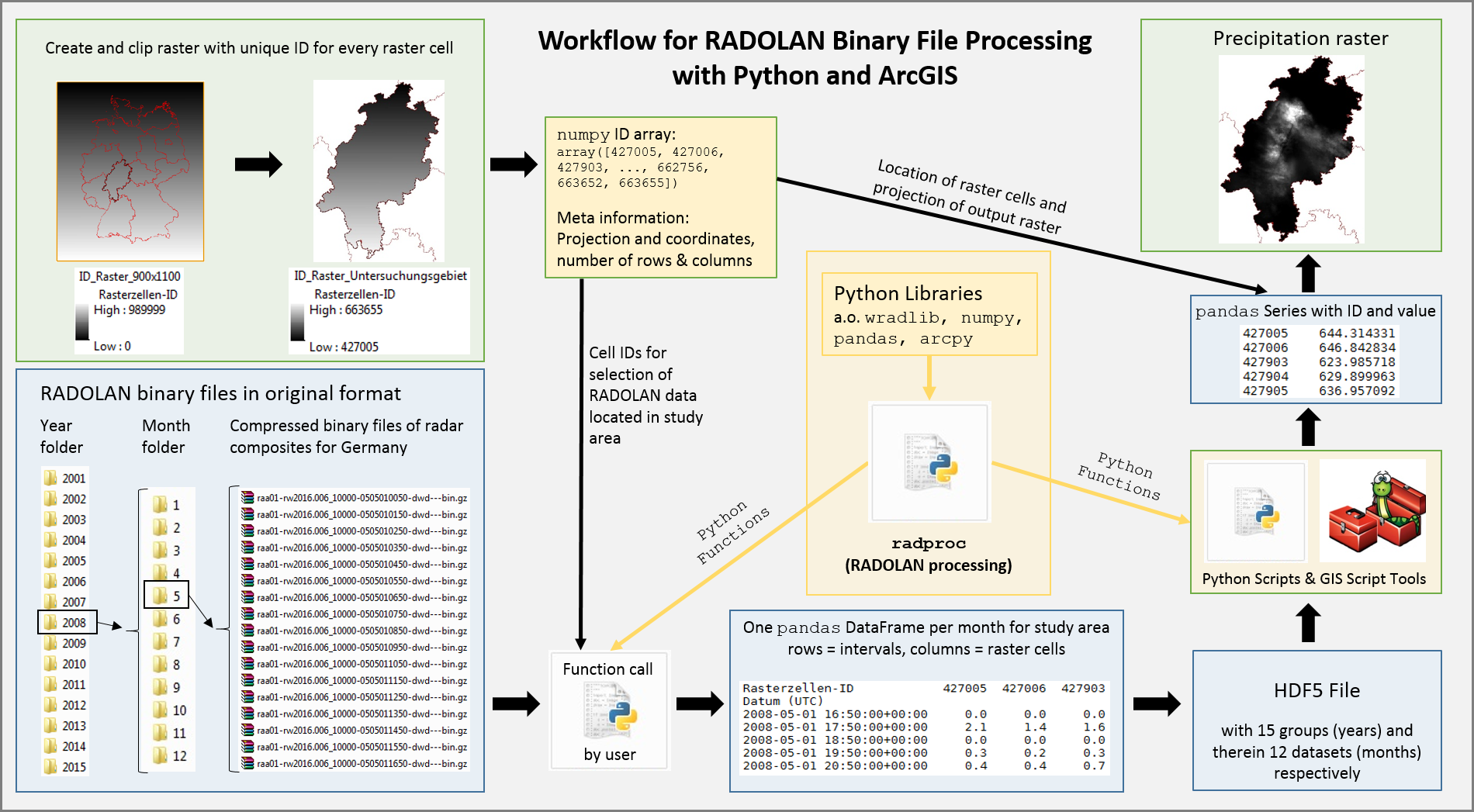Getting Started¶
System requirements¶
To be able to use all features offered by radproc, you need…
- a 64-Bit operating system (32-Bit systems can not allocate more than 3 GB memory, which is not sufficient for weather radar data processing)
- Python version 2.7 (64-Bit). It is strongly recommended to use the Anaconda distribution since this already includes all required scientific site-packages.
- ArcMap version 10.4 or newer
- ArcGIS 64-Bit background processing
- for processing of RADOLAN/RADKLIM data in 5-minute resolution at least 16 GB RAM are recommended
Installation¶
First, install ArcMap for Desktop and its extension 64-Bit background processing.
Next, download and install the latest Anaconda distribution from https://www.anaconda.com/download/ (Windows, 64-Bit, Python version 2.7). Due to the link to ArcMap, which runs on Python 2.7, radproc is currently NOT available for Python 3.
All radproc versions are hosted at the Python Package Index (PyPI). Thus, they can be directly downloaded and installed using pip.
To install radproc using Anaconda and pip…
Open the Windows terminal by typing CMD into the Windows search (Administrator rights may be necessary!).
Type:
pip install radproc
Now radproc is automatically downloaded from PyPI and installed into your Anaconda root environment. You can check by opening Spyder or Jupyter Notebook and entering:
import radproc
Alternative installation procedure:
radproc is also available as wheel file for Python version 2.7 on Windows operating systems (64-Bit only!). You can download the radproc wheel (radproc-0.1.x-py2-none-any.whl) of any version from the GitHub repository at https://github.com/jkreklow/radproc/tree/0.1.4/dist To install the wheel file type:
pip install C:\path\to\wheelfile\radproc_wheel.whl
To enable your Anaconda distribution to “see” the arcpy package from your separate ArcGIS Python installation, you need to copy the Path file DTBGGP64.pth which is usually located at C:\Python27\ArcGISx6410.4\Lib\site-packages into the corresponding site-packages folder of your Anaconda distribution, e.g. C:\ProgramData\Anaconda2\Lib\site-packages
To check if arcpy is now visible for Anaconda, import arcpy to Spyder or Jupyter Notebook:
import arcpy
File system description¶

File system and processing workflow used by radproc.
An extensive description of the file system and processing workflow is provided in the Technical Article associated to radpoc:
Kreklow, J. (2019): Facilitating radar precipitation data processing, assessment and analysis: A GIS-compatible python approach. Journal of Hydroinformatics, 21(4), 652–670. doi: https://doi.org/10.2166/hydro.2019.048
Getting data¶
RADOLAN is a weather radar product intended for operational applications in precipitation monitoring and nowcasting, water management, flood protection etc. with the composite being provided about 20 minutes after the end of the respective measurement interval.
RADKLIM is a reanalysis of all available weather radar data in Germany back to the year 2001 and primarily intended for climatological applications and heavy rainfall analysis. It is based on the RADOLAN software but more rain gauges are used for adjustment and more correction algorithms are applied on the entire time series in order to improve homogeneity of the dataset.
For more information on the datasets and their quality, please refer to the following publications:
Kreklow, J.; Tetzlaff, B.; Burkhard, B.; Kuhnt, G. Radar-based Precipitation Climatology in Germany – Developments, Uncertainties and Potentials. Preprints 2020, 2020020044. (doi: https://doi.org/10.20944/preprints202002.0044.v1)
Kreklow, J., Tetzlaff, B., Kuhnt, G. and Burkhard, B. (2019): A Rainfall Data Intercomparison Dataset of RADKLIM, RADOLAN, and Rain Gauge Data for Germany. Data, 4(3). (doi: https://doi.org/10.3390/data4030118)
- RADOLAN RW composites (900*900 1*1 km pixels, hourly resolution, historical data since 05.2006) are available at https://opendata.dwd.de/climate_environment/CDC/grids_germany/hourly/radolan/historical/bin/
- RADOLAN RW composites (900*900 1*1 km pixels, hourly resolution, recent data for last 48 hours) are available at https://opendata.dwd.de/weather/radar/radolan/rw/
- RADKLIM RW composites (1100*900 1*1 km pixels, hourly resolution, 2001 - 2017, DOI: 10.5676/DWD/RADKLIM_RW_V2017.002) are available at https://opendata.dwd.de/climate_environment/CDC/grids_germany/hourly/radolan/reproc/2017_002/bin/
- RADKLIM YW composites (1100*900 1*1 km pixels, 5 minute resolution, 2001 - 2017, DOI: 10.5676/DWD/RADKLIM_YW_V2017.002) are available at https://opendata.dwd.de/climate_environment/CDC/grids_germany/5_minutes/radolan/reproc/2017_002/bin/
If you want to access the radar data in ASCII file format for quick visualisation in GIS, please replace the ‘bin’ in the URL by ‘asc’. However, ASCII files can not be processed with radproc.